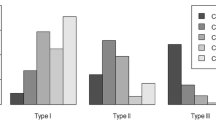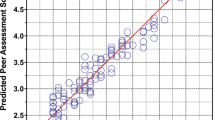Abstract
Reputational surveys frequently are used in evaluating doctoral programs. A sample of faculty-rated graduate programs and the resulting data are used to rank the programs in the academic discipline being considered. As an alternative, we present a new and auspicious assessment methodology by analyzing sixty doctoral programs in sociology for 1975/80 on six measures of research productivity and graduate education. We calculate two proximity matrices and reduce each with ALSCAL. Two solutions are generated: (1) per capita and (2) gross productivity of departments. These analyses show that conventional ranks contain a number of deficiencies and more comprehensive measures of departmental performance add important dimensions. We empirically document a tendency for conflict between faculty productivity and graduate education. Finally, our analyses suggest that omission of several assessment variables may have penalized departments emphasizing qualitative research. Recommendations for improving the next national assessment are advanced.
Similar content being viewed by others
References
Abbott, Walter F. and Henry M. Barlow. 1972. “Stratification Theory and Organizational Rank: Resources, Functions, and Organizational Prestige in American Universities.”Pacific Sociological Review 15:401–24.
Adams, Hazard. 1988.The Academic Tribes. Urbana: University of Illinois Press.
Astin, Alexander. 1985.Achieving Educational Excellence. San Francisco: Jossey-Bass.
Bair, Jeffrey H. and William E. Thompson. 1985. “The Academic Elite in Sociology: A Reassessment of Top-Ranked Graduate Programs.”Mid-American Review of Sociology 10:37–44.
Baird, Leonard L. 1986. “What Characterizes a Productive Research Department?”Research in Higher Education 25:211–25.
Bakanic, Von, Clark McPhail, and Rita J. Simon. “The Manuscript Review and Decision-Making Process.”American Sociological Review 52:631–42.
Barzun, Jaques. 1981. “The Wasteland of American Education.”The New York Review of Books (November 5):34–36.
Bellah, Robert N., Richard Madsen, William M. Sullivan, Ann Swider, and Steven M. Tipton. 1985.Habits of the Heart: Individualism and Commitment in American Life. New York: Harper & Row.
Blau, Peter M. and Bebecca Zames Margulies. 1975. “The Reputations of American Professional Schools.”Change 6:42–47.
Bowen, Howard R. and Jack H. Schuster. 1986.American Professors: A National Resource Imperiled. New York: Oxford University Press.
Burrell Gibson and Gareth Morgan. 1979.Sociological Paradigms and Organizational Analysis. London: Heinemann.
Cartter, Allan. 1966.An Assessment of Quality in Graduate Education. Washington, D.C.: American Council on Education.
Clark, Mary J., Rodney T. Harnett, and Leonard L. Baird. 1976.Assessing Dimensions of Quality in Doctoral Education: A Technical Report of a National Study in Three Fields. Princeton: Educational Testing Service.
Cochran, William G. 1963.Sampling Techniques. New York: Wiley.
———. 1983. “Historical Perspective.” Pp. 11–25 inIncomplete Data in Sample Surveys. Volume II, edited by William G. Madow, Harold Nisselson, and Ingram Olkin. New York: Academic Press.
Cole, Jonathan R. and Stephen Cole. 1973.Social Stratification in Science. Chicago: University of Chicago Press.
Conrad, Clifton F. and Robert T. Blackburn. 1985. “Program Quality in Higher Education: A Review and Critique of Literature and Research.” Pp. 283–308 inHigher Education: Handbook of Theory and Research. New York: Agathon Press.
Crane, Diana. 1970 “Scientists at Major and Minor Universities: A Study of Productivity and Recognition.”American Sociological Review 30:699–714.
Dolan, W. Patrick. 1976.The Ranking Game: The Power of the Academic Elite.. Lincoln, NB: University of Nebraska Printing Service.
Drew, David E. and Ronald Karpf. 1981. “Ranking Academic Departments: Empirical Findings and a Theoretical Perspective.”Research in Higher Education 14 (May/June):305–20.
Fechter, Alan. 1988. Personnal Communication.
Fowler, Floyd J. 1988.Survey Research Methods. Beverly Hills, CA: Sage.
Gans, Herbert. 1988. “Encouraging NSF Funding of Qualitative Research.”ASA Footnotes 16 (May):3, 5.
Glenn, Norval D. and Wayne Villemez. 1970. “The Productivity of Sociologists at 45 American Universities.”The American Sociologist 5:244–52.
Graham, Michael H. 1987.Federal Rules of Evidence. St. Paul, MN: West Publishing.
Hayes, Robert H. and William J. Abernathy. 1980. “Managing Our Way to Economic Decline.”Harvard Business Review 58 (July–August):67–77.
Jackall, Robert. 1988.Moral Mazes: The World of Corporate Managers. New York: Oxford University Press.
Jencks, Christopher and David Riesman. 1977.The Academic Revolution. Chicago: University of Chicago Press.
Jones, Lyle V., Gardner Lindzey, and Porter E. Coggeshell. 1982.An Assessment of Research-Doctorate Programs in the United States: Social and Behavioral Sciences. Washington, D.C.: National Academy Press.
Kanter, Rosabeth Moss. 1983.The Change Masters. New York: Simon and Schuster.
Knudsen, Dean D. and Ted R. Vaughan. 1969. “Quality in Graduate Education: A Re-Evaluation of the Rankings of Sociology Departments in the Cartter Report.”The American Sociologist 4:12–19.
Leonard, Wilbert M. and Raymond L. Schmitt. 1973. “Institutional Representation at the 1970, 1971, and 1972 American Sociological Association Annual Meetings.”Sociology and Social Research 58:6–12.
Lewis, Lionel S. 1968. “On Subjective and Objective Rankings of Sociology Departments.”The American Sociologist 3:129–31.
Lifton, David. 1982.Best Evidence. New York: Dell.
William G. Madow, Harold Nisselson, and Ingram Olkin. 1983.Incomplete Data in Sample Surveys. Volume I. New York: Academic Press.
Markovsky, Barry, David Willer, and Travis Patton. 1988. “Power Relations in Exchange Networks.”American Sociological Review 53:220–36.
Milner, {jrJr.}, Murray. 1987. “Theories Inequality: An Overview and a Strategy for Synthesis.”Social Forces 65:1053–89.
Morgan, David R., Richard C. Kearney, and James L. Regens. 1976. “Assessing Quality Among Graduate Institutions of Higher Education in the United States.”Social Science Quarterly 57:670–79.
Orr, Daniel. 1984. “An Anti-Benthamite View: An Economist Looks at College Rankings.”Change 16 (March):45–49.
Rau, William. 1980. “The Tacit Conventions of the Modernity School: An Analysis of Key Assumptions.”American Sociological Review 45:244–60.
——— and Paul J. Baker. 1989a. “The Organized Contradictions of Academe.”Teaching Sociology 17:161–75.
———. 1989b. “On the Unfinished Work of Connecting Problems to Solutions: Some Thoughts on Bowker and Gamson.”Teaching Sociology 17:181–83.
Rau, William and Dennis W. Roncek. 1987a. “Industrialization and World Inequality: The Transformation of the Division of Labor in 59 Nations, 1960–1981.”American Sociological Review 52:359–69.
———. 1987b. “Labor Force Transformation among Seven Major Industrial Nations, 1920–1970.”Social Science Quarterly 68:326–39.
Roose, Kenneth D., and Charles J. Andersen 1970.A Rating of Graduate Programs. Washington, D.C.: American Council of Education.
Shamblin, Don H. 1970. “Prestige and the Sociology Establishment.”The American Sociologist 51:154–56.
Shichor, David. 1970. “Prestige of Sociology Departments and the Placing of New Ph.D.’s.”The American Sociologist 5:157–60.
Skiff, Anthony. 1980. “Toward a Theory of Publishing or Perishing.”The American Sociologist 15:175–83.
Sorokin, Pitirim A. 1956.Fads and Foibles in Modern Sociology. Chicago: Henry Regnery.
Sturgis, Richard B. and Frank Clemente. 1973. “The Productivity of Graduates of 50 Sociology Departments.”The American Sociologist 8:169–80.
Tan, David L. 1986. “The Assessment of Quality in Higher Education: A Critical Review of the Literature and Research.”Research in Higher Education 243:223–65.
Thomsen, Ib and Erling Siring. 1983. “On the Causes and Effects of Nonresponse: Norwegian Experiences.” Pp. 25–59 inIncomplete Data in Sample Surveys. Volume III, edited by William G. Madow, Harold Nisselson, and Ingram Olkin. New York: Academic Press.
Webster, David S. 1983. “America’s Highest Ranked Graduate Schools, 1925–1982.”Change 15 (May–June):14–24.
———. 1985. “James McKeen Cattell and the Invention of Academic Quality Rating, 1903–1910.”The Review of Higher Education 8:107–21.
———. 1986.Academic Quality Rankings of American Colleges and Universities. Springfield, IL: Charles C. Thomas.
Westhues, Kenneth. 1976. “Class and Organization as Paradigms in Social Science.”The American Sociologist 11 (February):38–48.
Wilson, Logan. 1979.American Academics: Then and Now. New York: Oxford University Press.
Wilson, William Julius. 1987.The Truly Disadvantaged. Chicago: University of Chicago Press.
Yamagishi, Toshio, Mary R. Gillmore, and Karen S. Cook. 1988. “Network Connections and the Distribution of Power in Exchange Networks.”American Journal of Sociology 93:833–51.
Young, Forrest W. 1987.Multidimensional Scaling: History, Theory, and Applications. Hillsdale, NJ: Lawrence Erlbaum.
Additional information
Address correspondence to Department of Sociology, Anthropology and Social Work, Illinois State University, Normal, IL, 61761-6901.
Rights and permissions
About this article
Cite this article
Rau, W., Leonard, W.M. Evaluating Ph.D. sociology programs: Theoretical, methodological and policy implications. Am Soc 21, 232–256 (1990). https://doi.org/10.1007/BF02692424
Issue Date:
DOI: https://doi.org/10.1007/BF02692424




